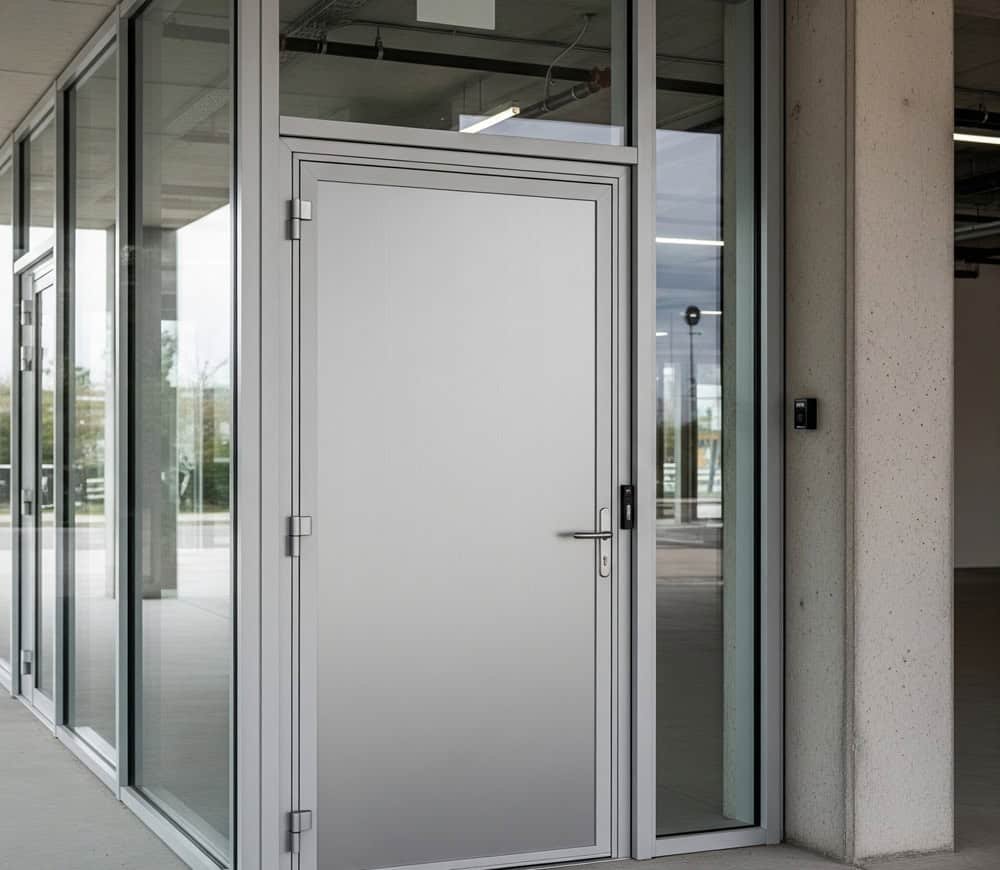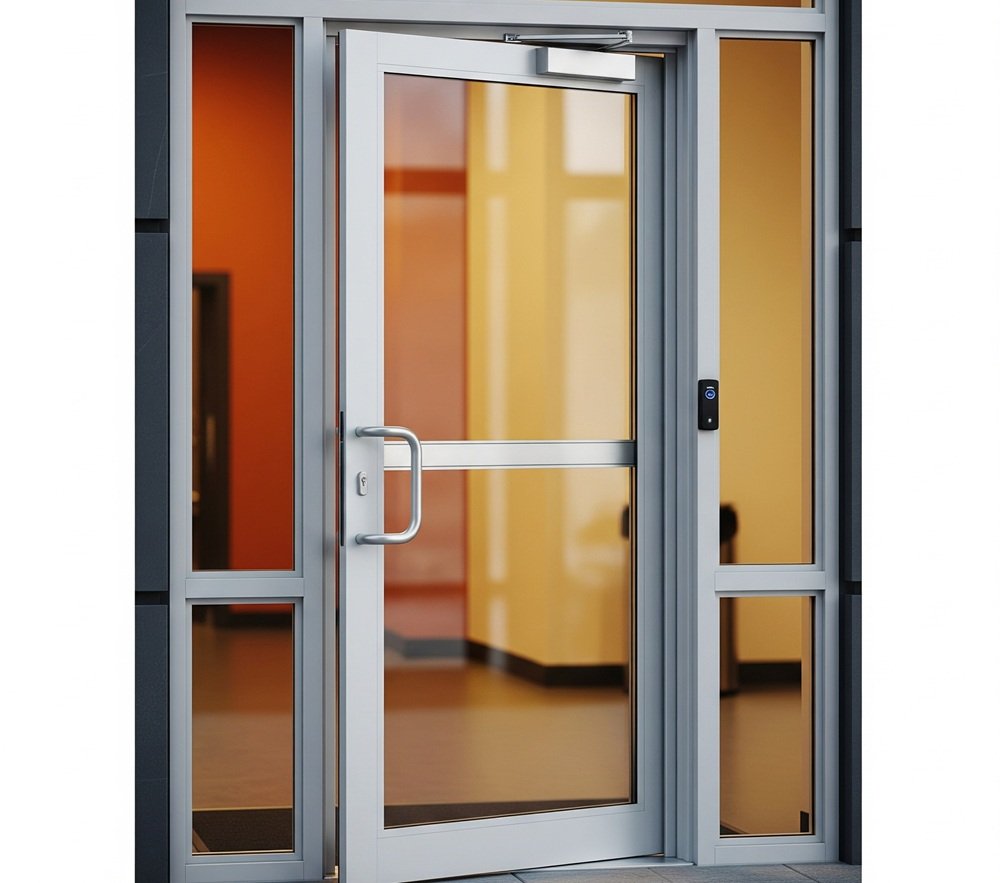Let us see which is best for your business in UK between steel vs. aluminium commercial doors.
Each and every detail matters when it comes to the world of commercial architecture. And choosing the right commercial doors becomes equally essential. For the businesses set up in the UK, security, weather resistance, durability, and cost-effectiveness are all top concerns.
Thus, selecting between steel and aluminium commercial doors is more than a simple aesthetic choice. The material you choose directly impacts the operational efficiency, energy consumption, maintenance needs, and overall safety of your business.
Steel and aluminium are the two most popular door materials in the commercial sector. Each comes with its own strengths and drawbacks. Whether you are outfitting a warehouse, a retail space, an office building, or an industrial site, understanding the core differences between steel and aluminium doors is essential for making an informed, long-term investment.
This article provides a comparison to help UK business owners and facility managers decide which material is best suited to their specific needs.
Steel vs. Aluminium Commercial Doors: Key Differences
Steel and aluminium doors differ in a variety of areas, including weight, strength, appearance, cost, insulation capacity, corrosion resistance, and application suitability.
| Feature | Steel Doors | Aluminium Doors |
| Strength | Extremely strong and impact-resistant | Strong but less so than steel |
| Weight | Heavier | Lighter |
| Corrosion Resistance | Prone to rust if untreated | Naturally corrosion-resistant |
| Cost | Generally, more affordable upfront | Slightly higher upfront cost |
| Maintenance | Requires more maintenance in humid/wet environments | Low maintenance |
| Appearance | Industrial, utilitarian | Sleeker, modern appearance |
| Customisation | Paintable, multiple finishes | Anodised finishes, sleek frames |
| Energy Efficiency | Excellent with insulation | Moderate, unless thermally broken |
| Best Use Cases | Security, fire doors, back-of-house areas | Front entryways, showrooms, modern offices |
Durability & Strength: Which Lasts Longer?

Steel is popular for its rugged durability. Commercial steel doors can withstand heavy impacts, high traffic, and harsh conditions without warping, bending, or breaking. For environments that demand robustness — such as warehouses, industrial facilities, and schools — steel offers long-lasting performance. With proper maintenance, a high-quality steel door can last 30 years or more.
Aluminium, on the other hand, is also durable but naturally softer than steel. It is more prone to denting and scratching, especially in high-traffic areas. However, modern aluminium alloys used in commercial doors are significantly stronger than residential-grade aluminium. With anodised or powder-coated finishes, they can resist corrosion and wear for decades. Still, in terms of sheer strength and lifespan under physical stress, steel holds the edge.
Verdict: Steel doors are the clear winner when it comes to strength and long-term durability in harsh or high-use environments.
Cost Comparison: Steel vs. Aluminium Doors
Cost considerations are essential in the decision-making process. Business owners must evaluate both upfront costs and long-term expenses like maintenance, repair, and energy savings.
Steel doors are more affordable upfront. A standard commercial steel door costs less than a comparable aluminium door. In addition, installation costs for steel doors are generally lower due to their availability and ease of fitting.
However, steel doors may incur higher long-term costs in humid or coastal areas due to corrosion risks unless they are galvanised or properly treated. Maintenance and repainting may also add to the total cost over the years.
Aluminium doors come with a higher initial price tag, primarily due to material costs and processing methods. But they make up for it with lower maintenance costs and excellent resistance to rust and corrosion. For businesses looking to reduce lifecycle expenses and avoid frequent maintenance, aluminium may prove more cost-efficient in the long run.
Verdict: Steel is cheaper upfront; aluminium may offer better value over time in certain environments, especially where corrosion is a concern.
Security: Which Door Offers Better Protection?
Security is a primary concern for UK businesses, especially those handling valuable inventory or sensitive data or operating in areas with higher crime rates.
Steel doors are widely considered the most secure commercial option. They are nearly impenetrable with standard tools, and their robust construction provides excellent resistance to forced entry. Combined with heavy-duty locking mechanisms, steel doors create a formidable barrier against intruders.
Aluminium doors are surely secured but they are not as strong as steel. They can be reinforced with laminated glass, internal steel reinforcements, and advanced lock systems, but the base material is inherently softer. That said, many high-end aluminium door systems offer acceptable security levels for office buildings, retail stores, and public facilities.
Verdict: For maximum protection, steel doors are the superior choice. Aluminium can be a secure option with added reinforcements, but it falls short of steel’s inherent strength.
Maintenance & Weather Resistance

In the UK, with its mix of damp weather, wind, and salt-laden coastal air, weather resistance is a vital consideration.
Aluminium doors excel in resisting corrosion and weather damage. Aluminium naturally forms a protective oxide layer that resists rust, and it performs well in humid or coastal climates. With minimal maintenance — occasional cleaning and lubrication of moving parts — aluminium doors can maintain their look and function for decades.
Steel doors, while strong, are more vulnerable to rust if their protective coatings wear off. However, galvanised or stainless-steel doors offer excellent resistance to the elements. Regular inspection and repainting can extend their lifespan significantly, but this does require a consistent maintenance schedule.
Verdict: Aluminium should be your choice for low maintenance and superior corrosion resistance, particularly in coastal or rainy areas.
Aesthetics & Customization Options
The appearance of a commercial door can influence customer perception and complement the design of the building. Here is how steel and aluminium stack up:
Aluminium doors have a sleek, modern appearance and are often used in shopfronts, showrooms, and offices where aesthetics matter. They can be powder-coated in a variety of colours and finishes, including metallic and woodgrain effects. Slim frames and large glass panels are easier to achieve with aluminium, enhancing visual appeal.
Steel doors tend to have a more utilitarian or industrial look, although they can be customised with paint, woodgrain finishes, or decorative panels. Some modern designs use steel in visually attractive ways, but the material is mostly chosen more for function than form.
Verdict: For businesses prioritising appearance and branding, aluminium offers greater aesthetic flexibility and a more modern look.
Energy Efficiency & Insulation
Energy efficiency is becoming increasingly important in the UK due to rising energy costs and environmental regulations.
Steel doors can be manufactured with insulated cores (such as polyurethane or polystyrene), giving them excellent thermal performance. They prevent heat loss, reduce drafts, and support climate control systems in warehouses, offices, and retail environments.
Aluminium doors, unless thermally broken, are poor insulators due to the metal’s high thermal conductivity. However, modern thermally broken aluminium frames — which include a non-metallic barrier in the middle — significantly improve insulation. Additionally, double or triple glazing can enhance energy efficiency in aluminium-framed glass doors.
Verdict: Steel doors with insulated cores outperform standard aluminium doors in energy efficiency. However, thermally broken aluminium systems narrow the gap considerably.
Best Use Cases for Steel vs. Aluminium Doors
Choosing the right door ultimately depends on your specific business type, location, and priorities. Here is when to choose each:
Best Use Cases for Steel Doors:
- Warehouses & factories: For high-traffic and heavy-duty use.
- Back entrances or loading docks: Where security and strength matter most.
- Fire-rated doors: Steel is superior for fire protection.
- High-security buildings: Banks, data centres, and utility buildings.
- Budget-sensitive projects: Steel provides strong value at a lower cost.
Best Use Cases for Aluminium Doors:
- Retail storefronts: sleek design and large glass panes draw customers in.
- Modern office buildings: aesthetic appeal and minimal maintenance.
- Coastal environments: naturally resistant to rust and salt exposure.
- Showrooms and reception areas: Emphasise appearance and brand impression.
- Low- to medium-security needs: Offices, clinics, or schools.
Verdict: There is no one-size-fits-all answer. Steel is ideal for durability, strength, and security, while aluminium is best for appearance, corrosion resistance, and low maintenance.
This was it about Steel vs. Aluminium Commercial Doors? If you prioritise security, strength, and insulation, steel is often the better choice. It excels in high-traffic and demanding environments. On the other hand, if you are looking for modern aesthetics, corrosion resistance, and low maintenance, aluminum is the way to go — especially in public-facing or coastal settings.
Contact Door Engineers for commercial aluminium doors in Birmingham.
FAQs
Yes. Steel doors offer superior security due to their strength and resistance to forced entry. They are ideal for businesses needing maximum protection.
Steel doors are generally more affordable upfront. Aluminium doors may offer lower maintenance costs over time, but the initial investment is higher.
No. Aluminium is naturally resistant to rust and corrosion, making it ideal for humid or coastal UK environments.
Yes. Many commercial steel doors come with insulated cores for excellent thermal performance, making them suitable for energy-conscious businesses.
Steel is better for high-traffic environments due to its strength and durability. It resists dents and damage more effectively than aluminium.

